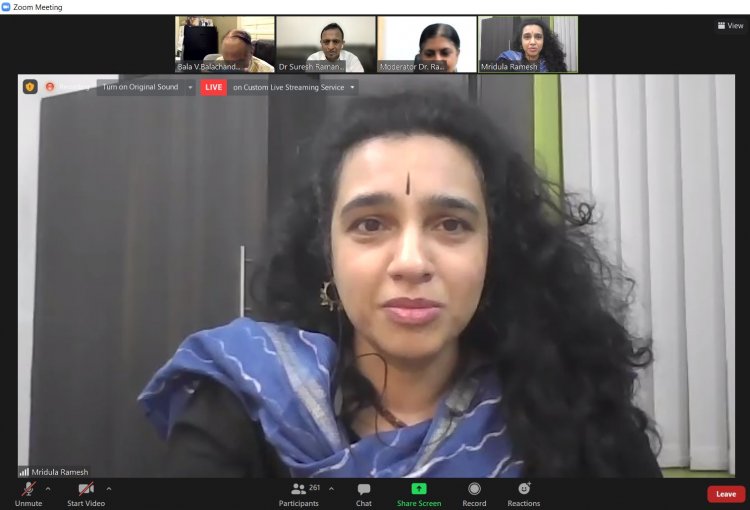Great Lakes Institute of Management hosts Mridula Ramesh as part of its ‘Distinguished Thought Leadership Series’

Mumbai: Ms. Mridula Ramesh, Executive Director- Sundar Textiles & Founder - Sundaram Climate Institute graced Great Lakes Institute of Management, Chennai in a virtual fire-side chat organized by the institute. Ms. Ramesh addressed a strong audience of 250+ participants and shared her insights based on the changing climate and what it means for the emerging leaders.
During the session, Ms. Ramesh highlighted some key points related to how the world has changed and drew the audience’s attention to the climate conditions in February 2020. Ms. Mridula Ramesh also highlighted the exponential rise in incidences and damages from floods and natural calamities due to the planet becoming warmer by 1 degree Celsius to showcase the intensity of damage a single degree change can cause to the world.
She further elaborated and said that it is the human tendency to blame the climate for everything which in turn is a false narrative. The author of a critically acclaimed book, shared insights, and answers to an important question “who will be hurt the most by the climate change?”. Ms. Mridula said underlined with explanation that India is most vulnerable to the climate change compared to some other nations and that its economy is more exposed to the climate risks. India not having the financial space to manoeuvre these climate risks and that causing everyone to get impacted by it in the years to come were some key pointers brought up during the session by the speaker.
The thought leader, Ms. Mridula Ramesh, raised a very important question, ‘how we adapt to the climate is important?’. She said that we need to talk about water and waste, together. India is not a big emitter but has the highest carbon price which has allowed to give birth to unicorns in the field of solar, renewable and EVs. She highlighted that India is not good at managing water and that we provide about 50-70 litres per day per person once-twice a week. Our country spends too less on water and she again raised a question whether water should have a price? The audience response was interesting as majority said no. She opined that we need a formal water pricing have and presented examples of Israel and Singapore, who are not only been able to adapt to but also create a global water entrepreneurship and water innovation economy which is adding billions to their GDP every year. She suggested, that implementing these solutions will further add immense value and build a robust climate resilience for the nation.
She next addressed a question on whether we would be willing to pay more for a green product. 80% of the audience said yes, and were willing to pay 5-10% premium for a sustainable product. She said that, climate in future will touch every part of our personal and professional life. She said, understanding climate change will give us a source of competitive advantage and build for a better tomorrow. The urgency to adapt climate change has accelerated in the past few years and the pace of climate change is fast and more man-made than natural.
Speaking during the event, Dr. Suresh Ramanathan, Dean, Great Lakes Institute of Management, said “We are honoured to have the presence of Ms. Mridula Ramesh. Her wisdom, knowledge, experience and vision is unparalleled and we are glad to have presented Great Lakes’ students with the opportunity to pick on her thoughts and gain a managerial and entrepreneurial perspective about climate change, water and other crucial resources, along with its implications on our generations and the future. Her ideas, analogies, unique problem-solving methods while building local resilience surely gave us all a new outlook towards waste management and explained how we can make a difference on our level. We are grateful for her time and the valuable insights shared and also look forward to hosting many such global thought leaders in the future sessions of the Thought Leadership Series.”















































